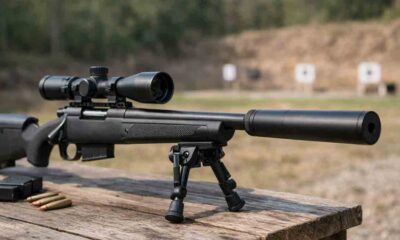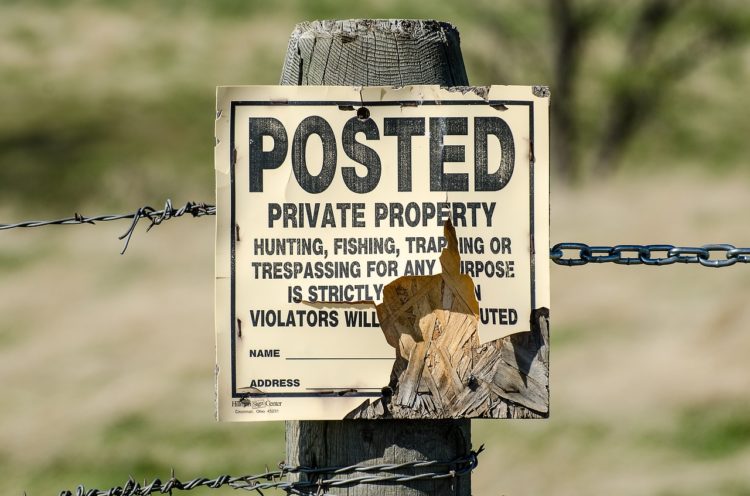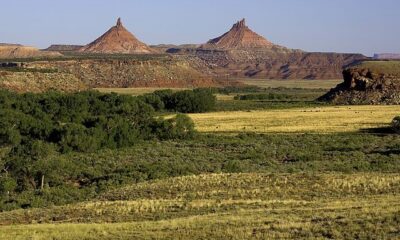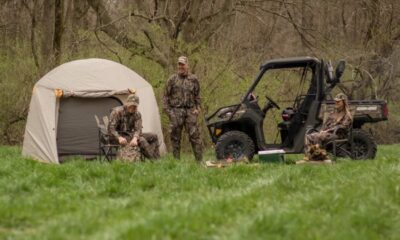Hunting
“Corner Crossing” Case May Open Millions of Acres to Hunting
Remember those four hunters who used a ladder to reach public land?
Backcountry Hunters & Anglers has filed an amicus brief in a high-profile public access case that the U.S. District Court for Wyoming is expected to hear this summer. The ruling in the case, Iron Bar Holdings vs. Bradly Cape et al, could help establish the legality of a means of accessing public lands known as “corner crossing,” the act of stepping from one corner of a parcel of public land to another, potentially opening up access to millions of acres in 11 Western states.
Public lands can be inaccessible due to being “landlocked,” surrounded by private land on which there is no easement, public road or public trail. In the fall of 2021, four non-resident hunters were issued citations in Carbon County. Wyoming, for criminal trespass. The four hunters never touched private lands: They used a ladder to cross between adjoining corners of public lands managed by the BLM.
In its brief, BHA maintains that the plaintiff in this case “cannot secure for itself the value of public land interspersed with its property by threatening trespass, since the government and its licensees (the public) have an equal right to access their lands.”
As the basis for its position, BHA relies on the Unlawful Inclosures Act, passed by Congress in the late 1800s to settle the range wars erupting between cattlemen and farmers over access and use of land in the West, as well as cases interpreting that law. The UIA outlines broad prescriptions against enclosing public land, emphasizing that “no person, by force, threats, intimidation, or by any fencing or inclosing, or any other unlawful means, shall prevent or obstruct … any person from peaceably entering upon … any tract of public land … or shall prevent or obstruct free passage or transit over or through the public lands.”
As early as 1897, the Supreme Court held that the UIA protects corner crossing as a means for members of the public to access public lands. In the years since, federal courts have continued to apply the UIA to prevent private landowners from prohibiting corner crossing from public land to public land. As one example, in 1988 a Federal Circuit Court held that the “UIA proscribes unlawful enclosures; enclosures are unlawful when they deny access to public lands for ‘lawful purposes.’” That decision upheld a lower court’s finding that “the free passage of hunters and their quarry is a lawful purpose for which the public may seek access to public lands.”
Absent the protections of the UIA, “a barrier embracing many thousand acres of public lands would be raised, unsurmountable except upon terms prescribed by [landowners],” explained another early 20th century Circuit Court decision. “Not even a solitary horseman could pick his way across without trespassing,” the court explained, holding that threats of trespass could not be used to prevent corner crossing under the UIA.
BHA’s brief also argues that the UIA takes precedence over conflicting state law. “Federal law, not state law, governs the issue of whether private landowners can prevent corner crossing,” BHA’s brief says. “The UIA reflects the exercise of Congress’ police power to abate the nuisance of landowners proscribing access to public land at corners, overriding competing state law concerns.”
“A landowner with half the ownership of a corner does not have the right to restrict public access by the owner of the other half of the corner – namely the federal government, and by extension, the people of the United States of America,” said Land Tawney, BHA president and CEO.
“BHA members rely on access to public lands and waters to pursue our passions,” Tawney continued, “and thus we are deeply invested in resolving the issues surrounding corner crossing.”
BHA’s Wyoming chapter has risen to defend the four hunters, raising funds – currently more than $115,000 – for their legal defense. Thousands of BHA members and supporters likewise have pledged their support for corner crossing and the ability of members of the public to legally access U.S. public lands.
“Since BHA was founded around a campfire almost 20 years ago, we have been proud to fight for the values of the public lands hunter and angler,” Tawney stated, “and we are committed to ensuring that access to our public lands and waters is freely available to us all. We thank the court for its decision to grant our motion to participate in the proceedings, and we feel strongly that we can offer unique information and perspectives that can help the court as it considers the issues presented in this case.”
-

 Adventure2 weeks ago
Adventure2 weeks agoSHOT Show 2026: The Most Important New Outdoor Gear Announced in Las Vegas
-

 Gear4 weeks ago
Gear4 weeks agoSuppressors in the Outdoors: Safety, Legality, and Ethical Use in 2026
-

 Camping & Survival2 months ago
Camping & Survival2 months agoCompact Emergency Kits for Outdoor Preparedness
-

 Camping & Survival1 week ago
Camping & Survival1 week agoWinter Road Status Checks Before You Access Public Land







